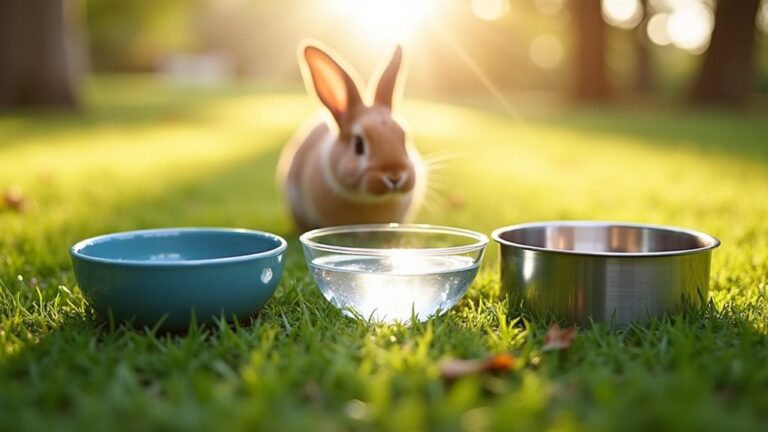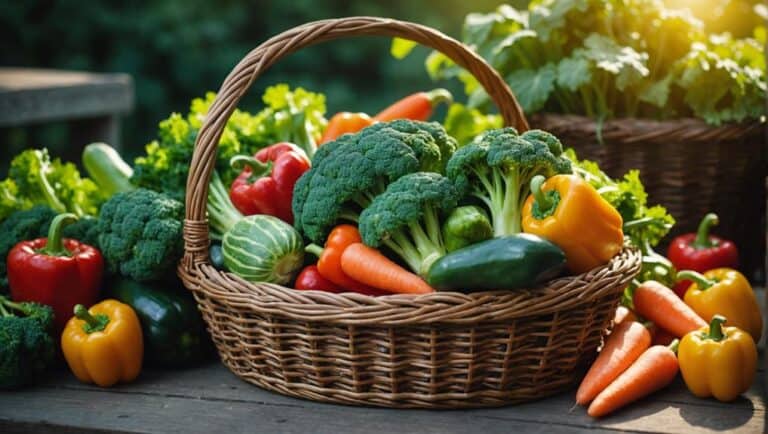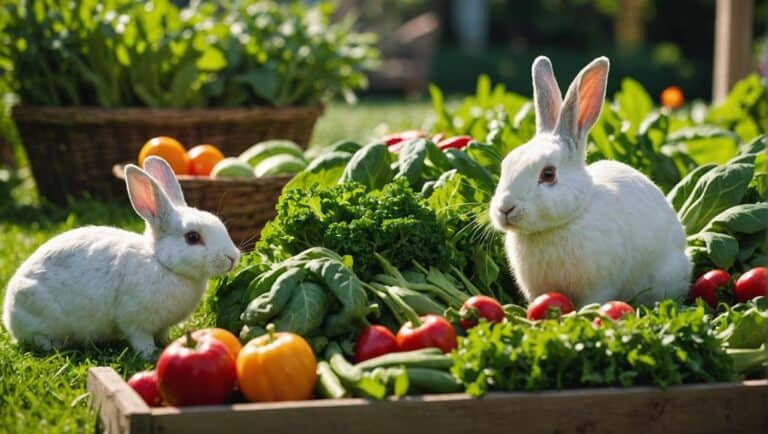Did you know that protein makes up around 16-20% of a bunny's diet?
This essential nutrient plays a critical role in maintaining your furry friend's overall health and well-being.
By understanding why protein sources are important in a bunny's diet, you can guarantee that your pet receives the necessary nutrients for best growth and vitality.
Contents
- 1 Key Takeaways
- 2 Protein Requirements in Bunny Diet
- 3 Importance of Protein in Bunny Nutrition
- 4 Role of Protein in Bunny Health
- 5 Protein-Rich Foods for Bunnies
- 6 Protein Digestion in Bunnies
- 7 Protein Quality for Bunnies
- 8 Protein Deficiency Symptoms in Bunnies
- 9 Frequently Asked Questions
- 10 How Does Proper Hydration Impact a Bunny’s Protein Intake and Diet?
- 11 Conclusion
Key Takeaways
- Protein sources are crucial for growth, energy, and amino acids in bunnies.
- Balanced protein intake supports muscle growth, health, and overall well-being.
- Excessive protein can lead to weight gain and digestive issues in bunnies.
- Consulting a vet helps determine appropriate protein levels based on age and activity for optimal bunny health.
Protein Requirements in Bunny Diet

Protein requirements in a bunny's diet play an important role in ensuring their overall health and well-being. Proteins are essential for providing energy, supporting growth, and supplying necessary amino acids for proper body function. The protein content in a bunny's diet is significant, with average protein requirements ranging from 12-16% for most pet rabbits. However, pregnant and nursing bunnies may require a higher protein intake, up to 18%, to support the demands of their reproductive processes.
It is important to obtain dietary protein from plant-based sources to maintain a healthy balance in a bunny's nutrition. Plant-based proteins offer a variety of essential amino acids important for the overall well-being of rabbits. Excessive protein intake can lead to health complications such as weight gain and digestive issues in these delicate animals. Consulting a veterinarian to determine the appropriate protein needs based on the bunny's age and activity level is essential in preventing such health complications and ensuring the best health for your furry companion.
Importance of Protein in Bunny Nutrition
Proteins are important for your bunny's growth and overall health, providing essential amino acids necessary for important bodily functions.
Meeting the right protein requirements is key to supporting your rabbit's energy levels and well-being.
Ensuring a balanced protein intake from quality sources like grasses can help prevent weight gain and digestive complications in your furry companion.
Protein for Growth
For optimal growth and development in bunnies, ensuring a balanced intake of essential amino acids from protein sources like alfalfa and timothy grass is essential. Protein plays a vital role in supporting tissue development, repair, and muscle growth in rabbits. Adequate protein levels contribute to the overall maintenance of a bunny's body, promoting health and vitality.
Protein for Health
Ensuring a balanced intake of essential amino acids from protein sources is important for maintaining the health and vitality of your bunny.
- Proteins are essential for energy, growth, and overall body function in bunnies.
- Essential amino acids found in proteins support various physiological processes in rabbits.
- Proper protein intake is vital for maintaining muscle mass and promoting tissue repair in bunnies.
- Balancing protein intake is key to preventing weight gain and ensuring digestive health in rabbits.
Role of Protein in Bunny Health
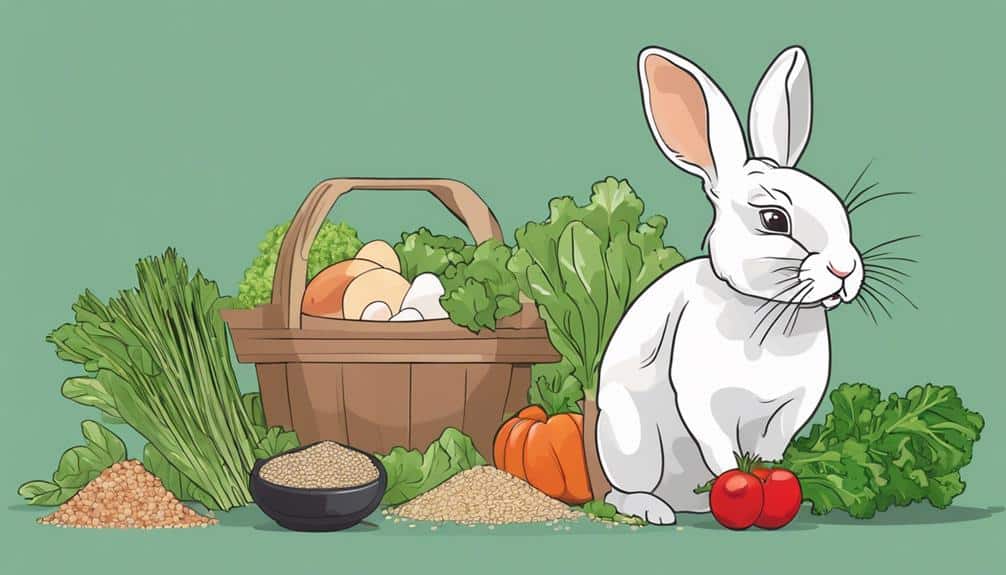
In the health of bunnies, protein plays an essential role, supporting energy, growth, and overall well-being. Proteins are important for providing the necessary building blocks, such as essential amino acids, required for proper body function and development in pet rabbits. Meeting the average protein requirement of 12-16% is critical, with pregnant and nursing bunnies needing higher levels at around 18% protein.
It's important to note that an excess of protein can lead to weight gain and digestive issues in rabbits, highlighting the significance of maintaining a balanced protein intake from various sources. Muscle development, immune function, and overall well-being are all dependent on the proper intake of protein in bunnies.
Ensuring that your bunny's diet includes adequate protein is essential for their growth, health, and happiness.
Protein-Rich Foods for Bunnies
Protein-rich options like alfalfa and timothy grass are essential components of a bunny's diet due to their fiber content and digestibility. These protein sources play an important role in supporting the growth and overall health of bunnies.
When considering protein-rich foods for your bunny, keep in mind the following:
- Alfalfa and Timothy Grass: Rich in protein and fiber, these grasses offer a balanced nutritional profile for bunnies.
- Digestibility: Alfalfa stands out as a highly digestible protein source for rabbits, ensuring efficient nutrient absorption.
- Protein Intake: Outdoor bunnies with higher activity levels may benefit from a protein intake of around 16%, while indoor bunnies typically require 12% for optimal health.
- Consultation: Seeking guidance from a veterinarian to determine the appropriate protein intake based on your bunny's age and activity level can help prevent digestive issues and promote gastrointestinal health.
Carefully selecting protein-rich foods like alfalfa and timothy grass can contribute significantly to your bunny's well-being and development.
Protein Digestion in Bunnies
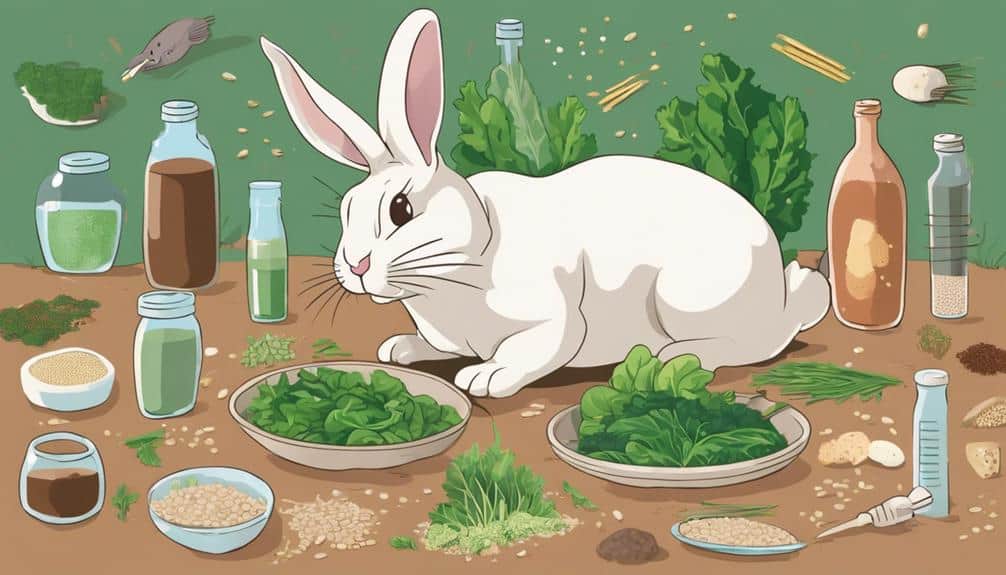
When bunnies consume proteins, their digestive system begins the process of breaking down these complex molecules into simpler amino acids.
Enzymes like trypsin and chymotrypsin, secreted by the pancreas, play a vital role in this protein digestion process.
Understanding how protein digestion functions in bunnies is essential for meeting their nutritional needs and promoting overall health.
Bunny's Protein Requirements
Proper growth and maintenance in bunnies hinge heavily on meeting their essential protein requirements, crucial for amino acid breakdown and overall bodily functions.
- Bunnies require a minimum of 12-16% protein in their diet for proper growth and maintenance.
- Pregnant and nursing bunnies may need higher protein levels, around 18%, to support lactation and growth.
- Alfalfa is a highly digestible protein source for rabbits, with a digestibility rate of approximately 75%.
- Consulting a vet can help determine the appropriate protein intake based on a bunny's age and activity level to avoid digestive issues.
Protein Sources for Bunnies
Shifting from discussing the importance of protein requirements for bunnies, understanding the ideal protein sources for these animals is crucial for ensuring their best health and well-being.
Rabbits benefit from protein sources like alfalfa or timothy grass, which offer higher fiber content and lower protein levels compared to cereals. Alfalfa, in particular, stands out as a highly digestible protein source for rabbits, with a digestibility rate of approximately 75%.
It's important to note that not all protein sources are easily digested by bunnies. Outdoor rabbits, due to their increased activity levels, may require a higher protein intake of around 16%, while indoor rabbits typically need about 12% protein.
To determine the suitable protein intake for your bunny and prevent digestive issues such as GI stasis, consulting a veterinarian is recommended.
Importance of Protein
To understand the significance of protein in a bunny's diet, it's essential to explore into the process of protein digestion in these animals.
- Protein sources are important for bunnies as they provide essential amino acids necessary for growth and body function.
- Bunnies require a balanced intake of proteins to support energy needs and maintain overall health.
- Protein digestion in bunnies is crucial for muscle development, tissue repair, and various metabolic functions.
- Proper protein sources help prevent deficiencies and promote best growth and development in rabbits.
Ensuring adequate protein intake in a bunny's diet supports their overall well-being and physiological functions. Proper digestion of proteins contributes importantly to the health and vitality of these animals.
Protein Quality for Bunnies
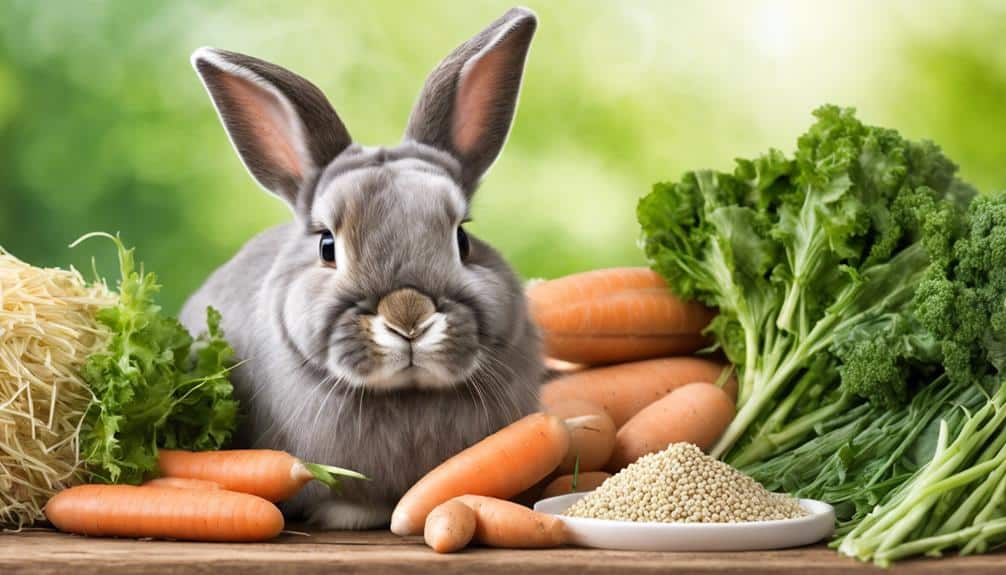
When considering the protein quality for bunnies, it's imperative to prioritize digestibility and essential amino acid content in their diet to support peak growth and maintenance. Grasses such as alfalfa are preferred protein sources for rabbits due to their high fiber content and lower protein levels compared to cereals. Alfalfa, specifically, is a highly digestible protein source for bunnies, providing essential amino acids important for their growth and maintenance needs. Not all protein sources are equal for bunnies, with alfalfa standing out for its protein digestibility of around 75%.
Selecting high-quality protein sources is important to meet the protein requirements of bunnies without overwhelming them with excessive nutrients. To make sure a well-balanced diet tailored to your bunny's age, activity level, and overall health status, it's recommended to consult with a veterinarian. Veterinarians can offer guidance on determining the ideal protein intake for your bunny, helping you make informed decisions for your furry companion's nutrition.
Protein Deficiency Symptoms in Bunnies
Experiencing protein deficiency, bunnies may exhibit various symptoms indicating inadequate intake essential for their growth and health. When bunnies lack sufficient protein in their diet, several symptoms can manifest:
- Poor Growth: Protein is vital for proper growth and development in bunnies. Inadequate protein intake can lead to stunted growth and developmental issues.
- Muscle Wasting: A lack of protein may result in muscle wasting, causing bunnies to appear weak and frail.
- Reduced Reproductive Performance: Protein deficiency can impact the reproductive capabilities of bunnies, leading to reduced fertility, decreased milk production in nursing does, and smaller litter sizes.
- Impaired Immune Function: Proteins are essential for a robust immune system. Insufficient protein intake in bunnies can weaken their immunity, making them more susceptible to infections and illnesses.
Recognizing these symptoms early on and addressing protein deficiency promptly is critical to guarantee the overall health and well-being of bunnies.
Frequently Asked Questions
Why Do Rabbits Need Protein?
You need protein sources for energy, growth, and body functions. Essential amino acids support muscle development and tissue repair. Meeting your nutritional needs is essential for growth, muscle strength, and immune function. Protein deficiency impacts your health negatively.
What Is Important to Provide About a Rabbit's Diet?
To keep your bunny healthy, focus on fiber intake, vitamin needs, calcium balance, digestive health, weight control, dental care, and hydration levels. Consistently meeting these requirements guarantees your rabbit's well-being and longevity.
How Much Protein Does a Bunny Have?
To meet a bunny's protein requirements, focus on digestible proteins. Provide varied protein sources with suitable content. Consider protein supplements if needed. Guarantee proper protein metabolism to avoid deficiencies. Consult a vet for personalized guidance.
What Is the Most Important Nutrient for Rabbits?
In a bunny's diet, the most vital nutrient is protein. It provides essential amino acids for growth and development. Protein rich foods support your bunny's health, with high quality sources ensuring digestibility. Don't overlook protein requirements for your bunny's well-being.
How Does Proper Hydration Impact a Bunny’s Protein Intake and Diet?
Proper hydration is crucial for the overall health of bunnies. The importance of bunny hydration cannot be overstated, as it directly impacts their protein intake and diet. Without adequate hydration, bunnies may struggle to properly digest and absorb the essential nutrients from their food, leading to potential health issues.
Conclusion
In summary, protein sources play a vital role in a bunny's diet, providing essential amino acids for growth and overall health.
Just like how a well-balanced diet fuels our bodies, ensuring that our furry companions receive the right amount of protein is essential for their well-being.
By incorporating protein-rich foods like alfalfa and timothy grass, we can help our bunnies thrive and lead healthy, active lives.
Remember, a healthy bunny is a happy bunny!

